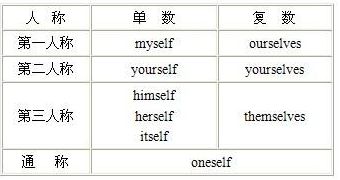考点三 代词的用法
一、人称代词
1.主格作主语,宾格作动词或介词的宾语. He teaches us Chinese .
2.三种人称代词并列时,顺序为:
◆ 单数:二三一(You, she and I )
◆ 复数:一二三(we , you and they )
3.it 的一些特别用法
①用作形式主语,常用于It’s +adj +to do sth句型中
②用在句型 It seems that …中
③用在句型It’s one’s turn to do sth中
④用在句型It’s time to do sth / for sth中
⑤用在句型It’s +adj +that 从句中
⑥用作形式宾语, 用来代替动词不定式 make /think /feel/find + it + adj./n. + to do sth
二、物主代词
1.形容词性物主代词作定语放在名词前,不能单独使用。
2.名词性物主代词,后面不能加名词。名词性物主代词常与of 连用。
Our classroom is as big as theirs .
This is a friend of mine.
【注】①名词性物主代词相当于形容词性物主代词加一个名词(名词性物主代词=形容词性物主代词+ 名词) ②形容词性物主代词与own 连用时,后面可跟名词也可不跟名词
my own house = a house of my own
三、反身代词
反身代词的常用搭配:
enjoy oneself
hurt oneself
teach oneself = learn…by oneself
all by oneself
help oneself to …
look after oneself
leave sb by oneself
lose oneself in
say to oneself
for oneself
dress oneself
improve oneself
四、指示代词
1.近指: this these 远指: that those
2.用法:
①that those 常用来代替前面出现的人或物,以避免重复。that代替可数名词的单数或不可数名词,those 代替复数名词。
The weather in Guangdong is hotter than that in Qinghai .
The books in this shop are cheaper than those in that shop.
②this ,that 可代替句子或句子的一个部分:that代替前面提到的句子,this代替下面提到的句子。
He had a bad cold, that is why he didn’t come.
I shall say this to you: he is an honest man.
③在电话用语中this 代替自己,而that 代替对方。
This is Tom speaking. Who is that ?
五、不定代词的区别
1.one与it 的区别
one 代替同类事物中的一种,而it代替上文中出现的某事物。
I left my book in my drawer, but today it is gone.
I don’t like this type of CD player. Could you show me a better one?
2.some与any 的区别
一般情况下,some用于肯定句,any用于否定、疑问句、条件句中,但在表建议的疑问句中,仍用some 代any,常用于could/would /May 开头或what about/how about …. 的句中。
May I have some water ?
He asked me for some paper , but I didn’t have any .
any用于肯定句中,常意为“任何” Any colour will do. 任何颜色都行。
3.many与much的区别
many+可数名词的复数,much+不可数名词,都相当于a lot of +复数名词/不可数名词
【注意】a lot of 不能用于否定句中
4.each与 every 的区别
each 表示两者或两者以上的人或物中的每一个,而every 表示三者或三者以上的人或物中的每一个。
There are trees and flowers on each side of the street.
【注意】each 可以与of 连用,each of 作主语时,谓语动词用单数;而every 不能与of 连用,只能放在名词前作定语。
Each of us is studying hard.
5.no one,nothing与none 的区别
◆ none可指人也可以指物,可与of连用;none用作主语时,若指不可数名词,谓语用单数,若指可数名词,则谓语可用单数(较正式)也可用复数(用于非正式文体,但更符合惯用法);
侧重指数量上“一个也没有”,一般用来 回答how many/much +n, 及含any+n 引起的疑问句,如:
None of us have/has seen him.
-How many cats are there in the room?
-None.
-How much money do you have on you?
-None.
-Is there any water in the thermos?
-None.
◆ no one通常用来指人,不与of连用;no one用作主语时,谓语动词用单数;一般用来回答who, 及含anyone、anybody引起的疑问句,如:
No one likes a person with bad manners. 没人喜欢没有礼貌的人。
-Who is in the room?
-No one.
-Is there anyone in the room?
-No one.
◆ nothing 通常用来指物。Nothing用作主语时,谓语动词用单数;一般用来回答what引起的特殊问句及含anything的一般问句,如:
-What is in the box?
-Nothing.
-Is there anything in the sky?
-Nothing.
6.both /neither /either /all / none / any 的区别
①both 的否定词是neither , all的否定词是none.
②both of 作主语时,谓语动词用复数;neither of作主语时, 谓语动词用单数。
Neither of the answers is right.
Both of my parents are workers.
③词组both …and …连接两个主语时,谓语动词用复数。同义词组:not only …but also … 反义词组: neither … nor …
Not only you but also she likes watching TV.= Both you and she like watching TV.
④词组either …or … 或者……或者…… , neither…nor… 既不……也不…… 连接两个主语时,谓语动词实行就近原则。
Neither you nor he is right .
One of Lily and Lucy is going to the park. = Either Lily or Lucy is going to the park.
⑤either也可以作副词,用于否定句中,表示“也(不)” neither通常用在句子(或简略答语)的开头,表示“也不”,其后要用倒装语序(将主语放在助动词、情态动词、系动词be之后)
If she won't go, neither shall I. (=If she won't go, I won't either.)
7.other /the other /others /the others 的区别
①one …the other … 表示两者之间的一个……另一个……
②some… others… 表示一些…… 一些……
③some...the others特指某个范围内一些人..., 剩下的人...
④another 表示三者以上的不确定数目中的另一个,只能修饰可数名词的单数。但another +数字+ 复数名词= 数字+ more +复数名词,表示“另外几个……”
Would you like another apple ?
I have two brothers. One is a teacher , the other is a worker .
Some are cleaning the classroom , and others are sweeping the window .
There are 20 teachers in our school . Eight of them are men teachers, and the others are women teachers.
8.复合不定代词
①复合不定代词作主语时,谓语动词用单数。Everything begins to grow in spring.
②形容词修饰不定代词时, 形容词放在不定代词之后。Is there something interesting in today’s newspaper?
③动词不定式修饰不定代词时, 动词不定式放在不定代词之后。I want something to eat.
④any ,anything ,anyone, anybody 也可用于肯定句中,表示任何……/任何物/任何人
He could mimic anybody 他可以模仿任何人。
考点四 数词的用法
基数词:表示人或事物数量多少的词
序数词:表示人或事物顺序的词
一、基数词
1.基数词是表示数目的词,一般可写为 245 或者 two hundred and forty-five
2.基数词一般是单数形式,但遇下列情况,常用复数:
①与of连用,表示概数
a hundred people 100个人
hundreds of people 好几百人
②在一些习惯用法/固定搭配中
The students arrived in twos and threes. 学生们三三两两的到了。
③in one's + 整十的基数词复数形式,表示在某人...多岁时
in one's 40s 在某人四十岁的时候
④表示“年代”
in the 1930s 在20世纪三十年代...
⑤名词(首字母要大写) + 基数词 = the +序数词 +名词
Lesson One = the first lesson
注:有些编号,一般仅用第一种表达法。Room 101 101号房间
⑥数词前加every ,表示每……/每隔……
every ten days = every ninth day 每十天(每隔九天)
注:every +基数词 +复数名词 = every + (序数词-1) +单数名词
二、序数词
1.基数词变序数词
【口诀】基变序,有规律,词尾要加th。
一二三,特殊记,词尾分别tdd(first second third )
八去t ,九去e,ve要用f替。
ty变作tie,再加th莫忘记。
若遇几十几,只变个位就可以。
2.序数词前一般加定冠词the,但序数词前与不定冠词a /an 连用时,表示 “又一,再一”。
You’ve done it three times .Why not try a fourth time ?
3.当序数词前有人称代词时, 用零冠词
That reminds me of my first dog.
三、分数
1.结构: a)分子用基数词,分母用序数词
b)当分子大于1时,分母加复数词尾 3/4--- three fourths
2.分数词的几种特殊形式:
1/2—a half/one half
1/3—one third = a third
1/4—one fourth = a quarter
3/4—three fourths = three quarters
3.分数词作主语时, 谓语动词的单复数形式根据分数词后面的名词来确定。
Two fifths of the milk has been drunk by Tom.
One third of the students are girls.
四、倍数
倍数的四种表达方法:
1.倍数/分数 + as + adj. +as
2.倍数/分数 + the size(weight, amount...) + of
3.倍数/分数 + adj.比较级 + than
4. by + 倍数


